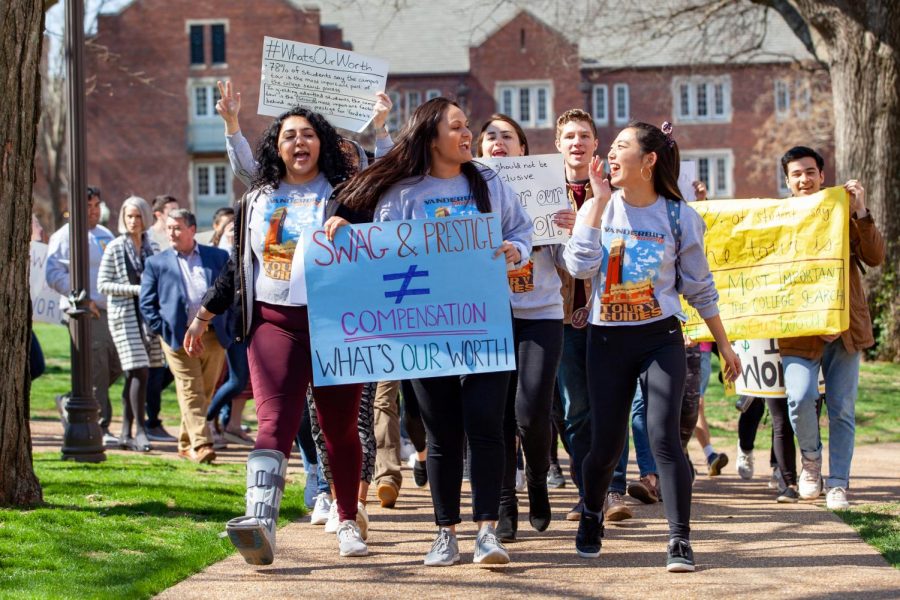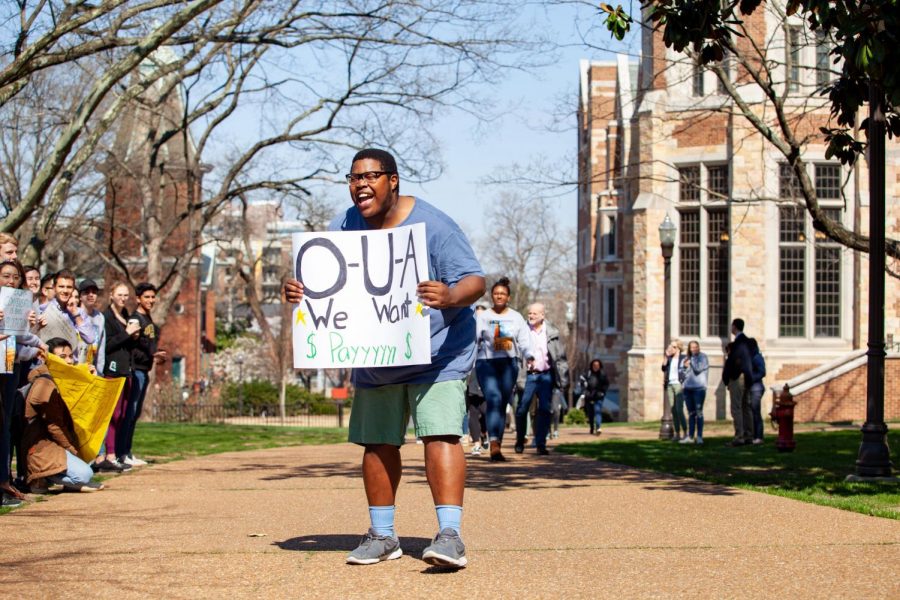Following student protests, an alumni petition and meetings with administrators, the Vanderbilt Tour Guides are moving forward with compensation discussions after university administrators said they could commit to paying guides in a student employment model. The tour guides staged a protest March 20, voicing their frustrations and stating that executive board would cease their activities after their April 1 meeting with administration if a resolution was not reached. At the conclusion of the April 1 meeting, the guides decided not to proceed with the strike.
“I consider the administration’s commitment to compensation to be a small victory in our attempt to address financial inclusivity and fair payment in organizations such as Tour Guides,” said Atlee Witt, the incoming Tour Guides president for 2019-2020. “I also appreciate the administration’s willingness to meet with the 2018-2019 and 2019-2020 executive boards and believe our demonstration was instrumental in bringing these crucial conversations to the table.”
The university is willing to pay student guides so long as there is not an attached student organization. The guides do have the option to forego pay if they choose to continue with the student organization model they currently operate under.
According to Doug Christiansen, Dean of Admissions, the choice to proceed as a student organization or to become student employees is entirely up to the Tour Guides. He said the reason students would have to give up their organizational status in order to receive pay has to do with the legal responsibilities that come with hiring and firing staff and management of funds, and that introducing a pay structure makes tour guides employees and therefore beholden to different rules than those a student organization must abide by.
“I feel like this was very much a win of what they requested. They wanted hourly pay, they wanted the ability to be paid and we now realize that’s a thing we should do and can do,” Christiansen said. “We hope if you talk to us a year from now, that the end result is we have motivated, highly gifted tour guides that are doing exactly what the current group does, it’s just in a different structure that allows us to meet one of their demands.”
In an email to the Tour Guides general body shared with The Hustler, outgoing president Telyse Masaoay said that the negotiations are ongoing.
“We now have a commitment from Dean Christiansen that the Office of Undergraduate Admissions can commit to a resolution that will compensate tour guides,” Masaoay said in the email. “The details about how, how much, when, or even if a compensation model will go into place are being ironed out. We know these discussions and this planning process will take time.”
A potential pay rate for the guides has not yet been set, though the March 20 statement by the tour guides said $10 per hour would be a possible rate on par with peer institutions. Christiansen said that administration first needs to look at student compensation for jobs across campus and within the admissions office, where student admissions assistants are paid for office work and summer positions, before determining the hourly pay rate.
Under an employment structure, the nature of student leadership among tour guides would likely change as well. Currently, the organization is managed by an executive board that runs the majority of the logistical operations, including recruitment processes. When pay is introduced, the administration will have a heavier hand in managing the student employees, though there will still be opportunities for leadership, John Gaines, Director of the Office of Undergraduate Admissions, said.
“While they might not be called an exec board, we’ll still have need for strong student leaders in a paid position to assist us with the work of the group, in a way that we do with our student admissions assistants right now,” Gaines said. “For instance, our experienced student admissions assistants train new student admissions assistants on how to answer the phone, how to manage the lobby, and that’s leadership, that’s real leadership within a paid position.”
Witt said her hope is that the university and the guides can come to an agreement that includes both compensation and maintains student leadership that is on par with peer institutions.
Another major consideration to be discussed is the size of the organization. According to information compiled by the guides, Vanderbilt currently has 150 tour guides within the organization. Both Masaoay and administrators noted that this number may change if the employment structure is implemented.
“We likely won’t have a group of 150 student employees,” Christiansen said. “Having an employee that works two hours every two weeks is not efficient, and so we will have to rethink that. But our hope is to work with the tour guides we have.”
There is a possibility that there will be a natural exodus of students who can no longer commit to the time required for a paid position, Christiansen said. Undergraduate student workers are limited to working up to 19 hours a week, and while they are allowed to have multiple jobs on campus, students who hold paid jobs on campus in addition to being a tour guide may find they would go over that limit, depending on the hours tour guides will require. Dean of Students Mark Bandas said that, for example, Head Residents would likely not be able to work in this structure because they already meet their 19 hours per week limit in their residential advising role.
While all parties consider this decision a victory and a step forward in meeting the tour guides’ compensation demands, there remains significant work to be done towards finalizing structural decisions. Payment will not begin until the fall, and the guides and administrators plan to spend the coming weeks and months working out the details of what the newest iteration of Vanderbilt Tour Guides will look like.
“The Tour Guides exec board considers this a small victory,” Masaoay said. “We are so excited that the administration is willing to commit to compensation. However, this is not the end of the negotiations.”




